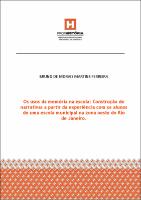Please use this identifier to cite or link to this item:
http://rima110.im.ufrrj.br:8080/jspui/handle/20.500.14407/15020| Tipo do documento: | Dissertação |
| Title: | Os usos da memória na escola: construção de narrativas a partir da experiência com os alunos de uma escola municipal na Zona Oeste do Rio de Janeiro |
| Other Titles: | The uses of memory at school: construction of narratives based on the experience with students from a municipal school in the West Zone of Rio de Janeiro |
| Authors: | Ferreira, Bruno de Morais Martins |
| Orientador(a): | Valle, Arthur Gomes |
| Primeiro membro da banca: | Valle, Arthur Gomes |
| Segundo membro da banca: | Azevedo, Patricia Bastos de |
| Terceiro membro da banca: | Costa, Warley da |
| Keywords: | Ensino de História;Saberes e práticas no espaço escolar;Cotidiano escolar e saberes históricos;Cidadania e identidade social;Protagonismo estudantil;Registros de memória;Teaching of history;Knowledge and experience in school environment;School Life and historical knowledge;Citizienship and social identity;Student’s empowerment;Memory record |
| Área(s) do CNPq: | Educação |
| Idioma: | por |
| Issue Date: | 23-Oct-2018 |
| Publisher: | Universidade Federal Rural do Rio de Janeiro |
| Sigla da instituição: | UFRRJ |
| Departamento: | Instituto de Ciências Humanas e Sociais |
| Programa: | Programa de Pós-Graduação em Ensino de História |
| Citation: | FERREIRA, Bruno de Morais Martins. Os usos da memória na escola: construção de narrativas a partir da experiência com os alunos de uma escola municipal na Zona Oeste do Rio de Janeiro. 2018. 111f.. Dissertação( Mestrado em Ensino de História) - Instituto de Ciências Humanas e Sociais, Universidade Federal Rural do Rio de Janeiro, Seropédica, RJ, 2018. |
| Abstract: | Essa dissertação de mestrado trata da proposição de uma oficina de construção de narrativas pessoais de alunos dos anos finais do ensino fundamental (do sétimo ao nono ano) na Escola Municipal Medalhista Mayra Aguiar da Silva, localizada em Campo Grande, zona oeste do município do Rio de Janeiro. A importância da construção dessas narrativas de memórias dos alunos se dá na medida em que, na realização da oficina, os alunos serão protagonistas na construção do conhecimento histórico, tanto local quanto escolar. O arquivamento de si mesmo representa um passo importante na consolidação da identidade desses alunos com relação à localidade onde vivem, podendo contribuir para a noção de pertencimento com a escola. Para tanto, discutimos conceitos sobre currículo de História e a disciplina escolar História. Para a realização da oficina, utilizamos o momento das disciplinas eletivas que compõe o programa do Ginásio Carioca, nas quais são trabalhadas atividades com múltiplos temas, para além do currículo escolar prescrito pela secretaria municipal de educação do Rio de Janeiro e dos PCN’s. Ao fim da realização da oficina de construção de narrativas de memória, fez-se um levantamento qualitativo e quantitativo do material produzido, que sofreu diferentes classificações na sua análise. Acreditamos que os alunos, enquanto componentes da comunidade escolar, e que também fazem parte da comunidade do bairro que a envolve, podem ser responsáveis pelos registros da memória local de onde residem e, ao mesmo tempo, construir saberes históricos a partir de suas vivências, que também são parte da memória da escola. A materialização dessa produção de memória e conhecimento histórico local resultou na produção de um acervo de memória dos “alunos fundadores” da escola que ficará disponível para os futuros alunos, professores e demais membros da comunidade |
| Abstract: | This master’s dissertation revolves around a workshop in which students offered personal narratives about their final years in Ensino Fundamental (Primary School), from seventh through ninth grades, in Medalhista Mayra Aguiar da Silva Municipal School, west zone of Rio de Janeiro city. Once the students are the leading figures in producing school and local historical knowledge we are able to understand the importance of this workshop of narrative building. Filing themselves represents an important step towards these students’ identity consolidation where they live - since many of them haven’t lived in this community for quite some time - besides creating the sense of belonging towards the school and the awareness of school history. To do so, it was necessary to discuss concepts about History curriculum and History as a school subject. In order to accomplish this workshop, we used the elective discipline period, that is a part of Ginásio Carioca program, in which activities of different aspects are carried out beyond the school curriculum, dictated by Secretaria Municipal de Educação do Rio de Janeiro (Rio de Janeiro Department of Education) and PNC’s. At the end of this workshop of narrative of memories, it was done a qualitative and quantitative data collection of the material, different classifications for analyzing students’ depositions, as members of school community that are also a part of the area around it. These students can be an active part in recording local memory and, at the same time, in building historical knowledge - using their own life experience - that is also part of the school memory. An archive of these first student’s memories will be available to future students, teachers and members of the community as the embodiment of this workshop of memory and local knowledge production. |
| URI: | https://rima.ufrrj.br/jspui/handle/20.500.14407/15020 |
| Appears in Collections: | Mestrado Profissional em Ensino de História |
Se for cadastrado no RIMA, poderá receber informações por email.
Se ainda não tem uma conta, cadastre-se aqui!
Files in This Item:
| File | Description | Size | Format | |
|---|---|---|---|---|
| 2018 - Bruno de Morais Martins Ferreira.pdf | 2018 - Bruno de Morais Martins Ferreira | 2.69 MB | Adobe PDF |  View/Open |
Items in DSpace are protected by copyright, with all rights reserved, unless otherwise indicated.

